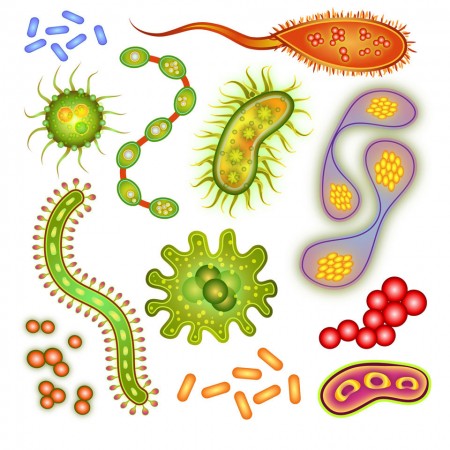
Germs play an important role in our daily lives — they can make us ill, but they also work to keep us healthy.
Despite a sickly childhood, University of Guelph graduate and visiting scientist Jason Tetro developed an infectious appreciation for microbes. Now a germ expert and the author of two books, The Germ Code and The Germ Files, Tetro (also known as “The Germ Guy”) wants us to develop a healthy appreciation for the germs that live in, on and around us.
“The reality is there’s really no place on Earth that is natural and free of microbiological life,” he says.
Recent research suggests that up to one hundred trillion microorganisms inhabit the human body. “For the most part, if you happen to have reasonably good health, you can find ways to work with microbes,” he says. Distinguishing the good ones, what he calls “bystanders” and “friends,” from the bad ones, or “foes,” is the first step.
Those good bacteria help with a variety of physiological functions, including digestion. When bad bacteria get the upper hand, taking a probiotic can help restore the bacterial balance. Tetro is a fan of probiotic supplements and calls Lactobacillus acidophilus, a common ingredient in these supplements, his “favourite” germ.
Bacterial foes include Staphylococcus aureus, which is commonly found on the skin. Antibiotics are the first line of defence against the potentially life-threatening infections it can cause but some strains have become resistant.
Another route of infection is the respiratory tract. Coughing and sneezing send infectious droplets containing cold and flu germs through the air. Tetro says if you’re within six feet, there’s a good chance you’re going to become infected if your immune system isn’t strong enough. Touching your eyes, nose or mouth after touching an infected surface is another mode of transmission.

Fortunately, practising good hand hygiene by washing with soap and water is one of the easiest ways to stay healthy. Hand sanitizer is the next best thing if you don’t have access to soap and water. “Alcohol basically shuts down everything. A bacterium simply cannot develop resistance to high concentrations — 62 to 70 per cent alcohol — because it’s a physical form of disinfection,” says Tetro.
Enclosed spaces where people congregate are bacterial hot spots, and airports are among the most germ-infested. Tetro cultured bacterial samples from touch screens in a Canadian airport and found bacteria as diverse as the global population. “I could not believe what I cultured. Some of the species that I saw, I’m like, ‘I don’t even know what this is.’”
Any form of public transportation is a breeding ground for bacteria. Tetro recently collected samples from a Toronto subway and its passengers — they’re not the only ones going for a ride. A subway pole can have 1,000 microorganisms per 10 square centimetres, but only 0.1 per cent are harmful.
Tetro wasn’t always pro-germ. During his many illnesses, he says, “I wanted to kill them all because I didn’t want anyone else to go through what I went through.” A bout with pneumonia in his mid-20s turned him from germ warrior to pacifist. He changed his diet to include more fruits, vegetables and fermented foods, and started taking probiotic supplements. “I haven’t had an antibiotic since nor have I needed one.”
Cold and flu season is here. Jason Tetro shares his top tips to stay healthy:
1. Wash your hands or use a hand sanitizer.
2. Take a probiotic supplement that contains lactic acid bacteria.
3. Only take antibiotics as a last resort; they don’t treat viral infections.
Photo: by Freepik.